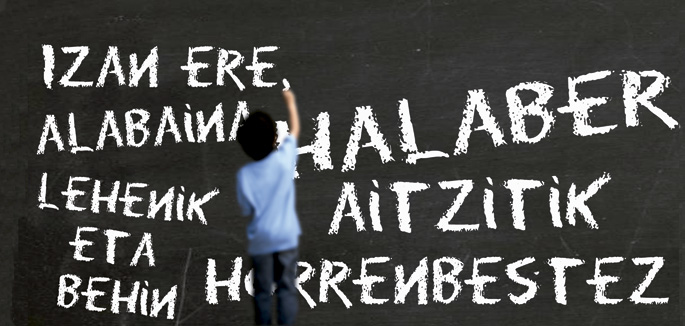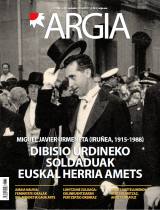What prose is ours?
- The question is whether the tendency to write in this way is becoming more widespread in Basque. Suppose the answer is yes: Why is it happening? Who is responsible for this? In the evening, two text lovers, Irene Arrarats and Joxerra Garzia, will tell us about their work.

How should I start writing this text? Who am I addressing? What is the best way to understand them well? These are the questions that, more consciously than ever, have come to mind when we sit in front of the computer. If you do this exercise and get the answers right, it will be an effective and quality way to write. However, without addressing these questions, the risk is evident: integrating ideas into learned or internalized phrases and structures, without hardly worrying about the form. In the conviction that this second trend is widespread, the desire to know why it occurs and what kind of prose prevails in this inertial writing has led us to written communication experts Irene Arrarats and Joxerra Garziaga.
“There is a very widespread prose, which in itself does not have much to do with the traditional prose: it does not look like classical writers, neither the popular writers of Auspoa, nor the oral form.” This is stated by the corrector and translator of Irene Bitxats Berria. What is that prose like? It relates it to three characteristics: on the one hand, the Basque is impoverished, with few resources and therefore repeats the same structures in most cases; on the other, it always acts in the same register, does not distinguish whether it is for a university exam or to announce the festivities of a people; and, finally, this form of prose is not in itself, that is, the majority that generates is an imitation of Castilian.
The diffusion of this prose model has also brought with it some automatisms: the withdrawal, the false Gerundians, the poor score – only using commas and dots – the excessive use of relative sentences… “For some, that is only the unified Basque. In the formal records, this form of prose is obtuse, without nuances; in contrast, in the colloquial record, it is a venom, because it is artificial and not graceful. However, many others do not devour this leek and, evidently, other forms of prose emerge, more communicative and more attractive”.
What purpose of communication?
Joxerra Garzia, who has reflected on Euskera and communication, believes that this type of generalized prose is tasteless and bottled. What he attributes is the primacy of correctness rather than the effectiveness of the text, since the function of a text is to correct what he wants to communicate. “The objectives are usually set within the text: cohesion, coherence and, of course, grammatical and syntactic correction. All of this is fine, but not as an objective, but as a means. The objective must be real, outside the text and the language: what we want to influence the reader through our writing”. However, in order to know whether the language or prose is effective, we must first know what is to be achieved. Garzia remembers a quote from Séneca: “Because there is no good wind for those who don’t know where to go.”
Arrarats is of the same opinion, but it seems dangerous to associate incorrectness with communicative capacity, as they are not enemies with each other. “A rule is also needed for licensing; to infringe the rule it also needs a rule. The standard, in itself, is not only the one that appears in this collection of Euskaltzaindia. The norm is what lies within the logic of language. It is beautiful to correct Damolat or Dizerdit, a sign of the Basque life force, but if it does not leave us, without thinking or thinking about it, I will say, therefore, as it is said, the problem is that the Basque system is foreign to us and, therefore, we have the risk of running out of system, that is, without language”.
Elegance dependent on Erda
These inertias that have prevailed over the one he writes are often associated with so-called elegance. As Arrarats says, if we say “The train is going to make its way right now”, some prefer to say “the train is going to come out now”. On the contrary, Garzia, in the idea that we are elegant and in the name of cohesion, refers to the connectors “in fact”, “but”, “first” and similar that we constantly use. This phenomenon is associated with Spanish or French, so Arrarats, being very difficult, having a constant echo of Spanish in the eyes and ears, appreciate the elegance of a language totally different from the structure. “There has been a gap in transmission, which has led to prejudices that have gained more strength than our tradition and which, unfortunately, do not provide any advantage in improving communication. That is, I think, the origin of our blind paths.”
What cannot be reproached for education
Clarifying in some way what that inertial writing is like and why it happens, it's time to look for those responsible. It seems a little strange to him that this model has been promoted in schools, but he recognizes that, to the extent that the Basque Country has been losing weight due to the socio-linguistic situation, it has been introduced in all areas, including schools. “Media, movies, video games... Most children receive it in Spanish. The Basque world reaches a few areas and the school cannot fill all the gaps in other areas.” However, remember that there is a great difference between what is read in Basque and Spanish in schools: literature in Spanish elaborated and brochures in Basque for adolescents in basic prose. “It’s a vicious circle: as we know nothing more than that impoverished Basque, we fear that if we ask more, we will not throw children away, but if you do not teach or listen, where will they come from?”
Despite its recent withdrawal, until recently, Joxerra Garzia has received the Faculty of Social Sciences and Communication from the UPV/EHU in Leioa to the students of Iga. “Will the prose of the students fall? It is possible, but I am much more concerned about the prose of teachers, and even more about those who teach communication. The prose level of our academic texts is, in general, regrettable.” It says that it is a scourge that extends to agents from outside of education and that is called into question the media in Basque: “Texts without grammatical errors are easily viewable. However, these texts often do not serve to obtain or influence anything, but they are a locomotive of inertia. That is not given importance, and if they are correct, they are published.”
The journalist Arrarats is the corrector of the newspaper Berria and her daily work is to review the texts of opinion and journalism. It recognises the tendency to constantly reinvent a language that it considers dangerous: “That everything necessary to improve communication changes, but as little as possible, so that the Basque Country does not become exonormative because of erosion.” If the traditional form or structure begins to be replaced by another, but does not assume a communicative advantage, why do we need it? Euskera is invented.”
There are no breathing spaces without proper speakers. Native speakers are the support, the oraceration, the mainstay and the foundation of the respiratory zones.
But let's start at the beginning: what are the respiratory zones? The word Arnasa is a word translated into Basque... [+]
Kaleko 71.000 elkarrizketa eta 227.900 solaskide behatu dituzte UEMAko herrietan, eta 2017koa baino ikerketa are sendoagoa burutu dute. Erabilera orokorra ez da ia aldatu: bostetik hiru aritzen dira euskaraz. Adina eta generoaren arabera badira desberdintasun batzuk.























